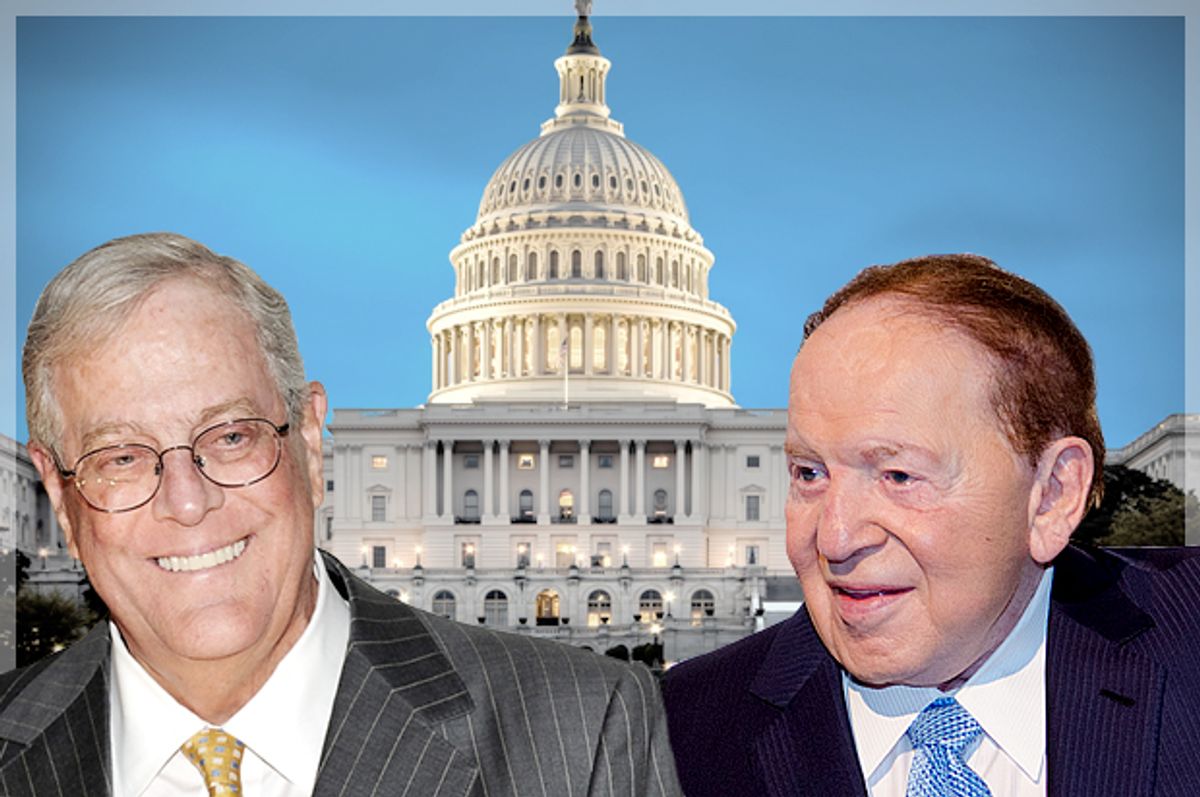The New York Times recently reported that President Obama is considering issuing an executive order that requires federal contractors to disclose their political expenditures. Up to 70 percent of Fortune 100 companies would be affected, according to Public Citizen’s Congress Watch.
Following months of heavy pressure from government-reform groups, this would be the president's first significant step to fix our utterly dysfunctional campaign finance system.
And, if implemented, the executive order would align the president with 85 percent of Americans who say they want fundamental changes in how we fund our elections.
Of course, it’s only a modest first of many needed reforms. The president conceded as much in his State of the Union address, declaring that we must “change the system”. Although Obama offered no details, those in the Democratic Party trying to succeed him agree on key reforms. Bernie Sanders and Hillary Clinton have both issued policy platforms proposing public financing of elections and initiating the legislative process to circumscribe Citizens United.
But why is fundamental change necessary? Isn’t disclosure enough, as some Republicans have suggested?
Unfortunately, no. Disclosure alone cannot solve the systemic problems and inequalities caused by our privatized and largely unregulated campaign finance system.
For example, even in a more transparent U.S. campaign finance system:
- Candidates would continue to seek large donations. Since there is no viable public financing system, candidates still feel obliged to seek out big money, often outside their constituency, to meet the extraordinary costs of campaigns. The suspicion that donors’ interests unduly influence candidates would therefore remain, undermining public trust.
- The majority of Americans would still be politically irrelevant. In 2014, analysis by political scientists Martin Gilens and Benjamin Page showed that a majority of Americans are essentially politically powerless. Policy is all but dictated by those people and groups with money. This is not surprising. In Oregon, for example, in 2014 those who gave more than $5000 to candidates—about one thousand individuals—contributed ten times more money than all small donors combined. Even if transparency were to discourage people from spending millions in donations, those spending large, but not extraordinary amounts, would still drown out voices of lower income individuals. The powerlessness of the majority of Americans would continue despite transparency.
- Traditionally marginalized groups would continue to be politically underrepresented. In order to be considered a “viable” candidate, let alone to win a party nomination, a candidate must have access to money—either one’s own or through connections. The current system makes it virtually impossible for people without resources to run for office—something that disproportionally affects people of lower socio-economic levels, women, and people of color.
- Fundraising will continue to interfere with legislating. Given the high cost of elections, some politicians spend more than half of their time in office raising money rather than serving the public. As a result, politicians can end up uninformed even about policies they propose and support..
Of course, transparency has its purpose. In a well-functioning democracy, citizens must know how candidates are funded. This helps voters make informed decisions. Obama’s executive order certainly would move us in this direction.
It is important to note that even after transparency laws are implemented two hurdles can prevent disclosure from functioning effectively:
- Disclosure is meaningful only if the information gathered is distributed to the public. Media outlets are the most effective and far-reaching disseminators of this information; yet, they have generally proved unwilling to serve this function in the US. In recent years, “networks have largely underreported the rolling back of campaign finance reform and the unprecedented influx of billions of dollars into the federal election system”. Only when an unprompted Bernie Sanders brought it up while appearing on national television did overall coverage increase. Groups like the Sunlight Foundation and Open Secrets are able to successfully distribute campaign finance information, but their potential reach is far less than traditional media sources.
- Disclosing money in elections serves as a deterrent to excessive donations only if the public makes accepting them politically dangerous. The Koch brothers openly admitted that they were willing to spend $900 million in the 2016 election cycle. While candidates hide the fact they receive these large contributions, they still actively seek them out. Public information therefore does not always act as a deterrent. As former MayDay CEO Zephyr Teachout has suggested, accepting large private donations must be made “toxic”. Only if the public holds politicians accountable for seeking out and accepting large donations will disclosure be highly effective.
Despite reasons to be pessimistic, there is no reason to give up. Yes, much more needs to be done to ensure greater transparency and fairness in our democracy. Yet, Obama’s potential executive order and the rapidly growing coalition ready to take immediate action to save our democracy should inspire hope that the needed change can be won.
Just as the president said, though, it is up to us, the people, to ensure a fair and equal democracy. We cannot be complacent.
Until the executive order is officially issued, we must continue to pressure the president. While many are cautiously optimistic the president will follow through on his promise to fight for our democracy, there is no guarantee.
And, in anticipation of the executive order and thereafter, our job must also be to expand the fight, advocating for even greater disclosure, contribution limits, revolving door bans, new ethics and lobbying laws, Federal Election Commission reform, and most important, public financing of elections and the restoration of the Voting Rights Act.
It will be a long, bitter fight to win comprehensive reform, but isn’t our democracy worth it?

Shares